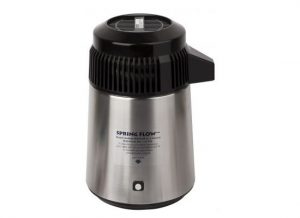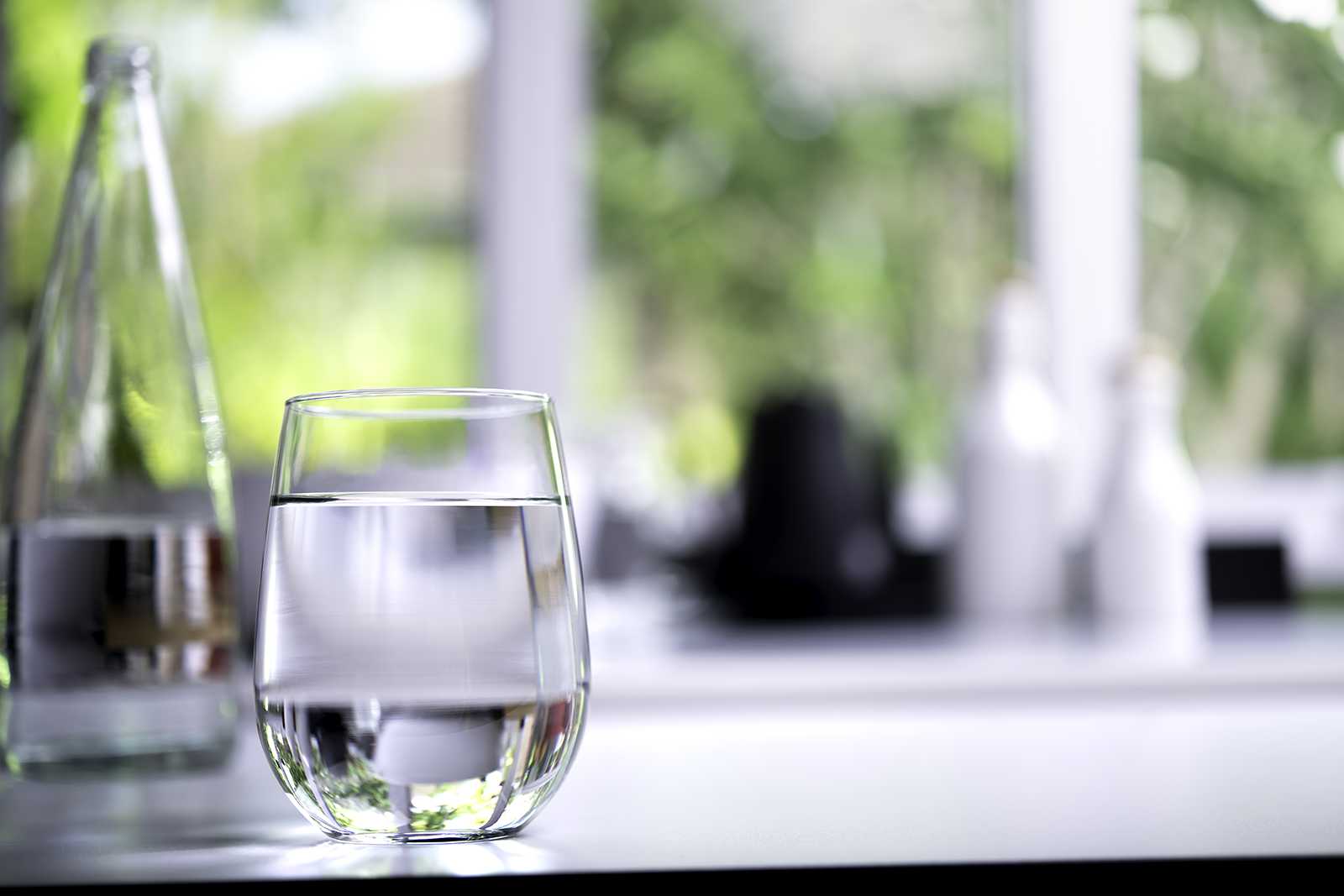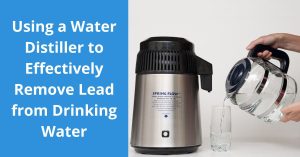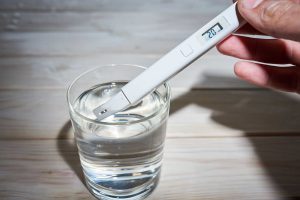Do you ever feel like the water from your tap just isn’t quite clean enough? Have you considered installing a water distiller but don’t know what one is or how it works? If so, this article is for you.
Water distillation has been around for centuries and has become increasingly popular in recent years as people strive to drink cleaner, purer water. But what exactly is a water distiller and why should we use one? Let’s take a look at its features and benefits to get an understanding of just how powerful these machines can be when it comes to giving us the best-tasting drinking water possible.
In this article, we’ll cover everything there is to know about water distillers; from their design and function to their advantages over traditional filtration systems. We’ll even give some tips on installation and maintenance so that you can reap all of the rewards without any hassle or worry! So read on if you want access to clean, delicious drinking water – after all, who doesn’t deserve that kind of luxury?
What Is Distilled Water Used For?
Pure, pristine, and perfect – distilled water is a powerful purifier of pollutants. It’s used in numerous applications to cleanse and protect our planet’s precious resources. From medical equipment to drinking cups, distilled water has become an essential tool for keeping us healthy and safe from contaminants.
Distilled water can be used for many reasons: it is free from toxins such as chlorine, lead, calcium oxide, nitrates, and other hazardous chemicals; it does not contain any hard minerals which could make soap less effective or cause scale buildup on pipes; it also has antimicrobial properties that help keep bacteria at bay. Its low mineral content makes it ideal for use with sensitive electronics like pacemakers or hearing aids. Additionally, its high purity level renders it suitable for making beverages taste better by removing unpleasant odors.
It can even be employed to manufacture cosmetics like moisturizers and facial cleansers that are gentler on the skin than regular tap water. Distilled water also plays a major role in helping maintain proper hygiene standards across industries including health care facilities, food processing plants, swimming pools, etc., by preventing disease-causing organisms from spreading through contaminated surfaces or materials.
Distilled Water What Is It?
Transitioning from the previous section, let’s explore distilled water and what it is. Distilled water is a type of purified water that has been boiled to remove all contaminants such as minerals, chemicals, and other impurities. The process of distillation involves boiling the water in an enclosed container until it reaches its boiling point. As the vapor rises, it condenses on a cooling coil or another surface to form droplets of pure liquid H2O – which is known as distilled water.
Distilled water is often used for drinking because it’s free from most dissolved substances like salts and metals that can be found in tap or groundwater sources. It also has no taste so it’s ideal for cooking and making beverages like coffee or tea with less “off-flavors” caused by mineral content in regular tap water. Additionally, because distilled water contains fewer compounds than regular tap water, many people prefer to use it for cleaning appliances like humidifiers since there are fewer residues left behind after evaporating.
Distillation does not filter out volatile organic compounds (VOCs) unless specifically designed for this purpose but most VOCs have very low solubility in hot waters anyway and will generally end up being removed through evaporation during the distillation process. In addition to using a home water distiller, you can purchase bottled distilled water at grocery stores if you don’t want to make your own at home—just make sure you check the label carefully before buying!
What Is Better Purified Or Distilled Water?
It’s like the difference between a clean, freshly-pressed suit and one that has been worn for days on end. Purified water is treated to remove impurities from it, such as chlorine or sediment, but these are not necessarily removed completely. Distilled water takes things one step further by boiling all contaminants away, leaving you with pure, crisp H2O.
So which of the two should you choose? It depends on what your primary goal is: Are you looking to enjoy drinking something free of additives and toxins or do you want to use it for medical purposes? If taste is your priority, then purified water may be enough. But if you want something safe for an infant’s formula or dialysis treatments, only distilled water can ensure that no particles remain behind after filtration.
The choice ultimately comes down to your own needs and preferences – both types have their advantages and drawbacks depending on how they will be used. However, when in doubt go with distilled – this way you know exactly what type of liquid you’ll get each time!
What If You Drink Distilled Water?
Drinking distilled water can have both benefits and risks. It is important to weigh the pros and cons of drinking distilled water so that you can make an informed decision about whether it is right for you.
Distilled water has no impurities or contaminants, making it a great choice if you are looking for clean, pure water. If your tap water contains high levels of dissolved minerals or heavy metals, then drinking distilled water will be beneficial as these substances will not be present in the purified form. Additionally, many people find that they feel more hydrated after consuming distilled water because there are no solids or residues left behind in their bodies.
However, there are also some potential drawbacks associated with drinking distilled water. For instance, since all of the minerals and other compounds found naturally in tap water have been removed during distillation process, consuming this type of H2O means missing out on essential nutrients such as calcium and magnesium which can help promote good health. Also, consistent consumption of ultra-pure H2O over time may cause electrolyte imbalances due to lack of certain salts and minerals needed by the body’s cells for optimal functioning.
Overall, when considering whether to drink distilled water regularly it is important to consider what kind of situation you are in before making a decision. If you live near industrial areas where pollutants may contaminate your local supply then purifying your own supply at home might be worthwhile; but if your regular source is relatively safe then getting those essential minerals through natural food sources could prove more beneficial than relying solely on distilled H2O.
What Is The Best Water Distiller For Home Use?

The best water distiller for home use is one that can produce clean, pure drinking water quickly and efficiently. Distillers are an excellent way to purify your drinking water without having to purchase bottled water or install a costly filtration system. In our opinion the best water distiller Australia has available is the Megahome/Springflow water distiller.
When shopping for the right distiller, you’ll want to consider factors such as size, cost, energy efficiency, ease of use and maintenance requirements.
For those looking for convenience, countertop models offer easy setup and operation with minimal required maintenance. If space is limited in your kitchen, look for wall-mounted or even under-counter models. Ultimately, choosing the best distiller comes down to finding which model meets your needs and budget while giving you the security of knowing you’re getting pure, high-quality H20 every time.
What To Add To Distilled Water For Drinking?
One choice is to add freshly squeezed lemon or lime juice to the water, which can help replenish some of the lost minerals and also infuses the distilled water with a fresh flavour. Another choice is to include Himalayan rock salt, which has a variety of minerals the body may benefit from.
Apple cider vinegar is an alternative that can aid digestion and provide certain nutrients. Ultimately, remineralization solutions can be used to add calcium, magnesium, and potassium back into distilled water. It’s crucial to remember that adding any substance to water could alter its pH level and general makeup; as a result, it’s recommended to use caution and seek medical advice if you have any concerns.
What Can I Use Instead Of Distilled Water?
If you don’t have access to a water distiller, there are plenty of other options out there. Here’s what you can use instead:
- Boiled Water – Boiling tap water for about 10 minutes will remove some bacteria and particles from the water. It won’t get rid of all impurities, though, so it may still contain minerals or chemicals.
- Filtered Water – A good quality filter system is designed to take out most pollutants from your regular drinking water. Depending on the type of filter used, this could be more effective than boiled water. Make sure to research different types of filters before investing in one.
- Bottled Water – If buying bottled water isn’t cost-prohibitive for you, that’s another option available. There are several well-known brands with high-quality standards when it comes to their production processes and testing procedures; however, they can become expensive over time due to the packaging waste generated by single-use plastic bottles.
These three alternatives aren’t really the best alternative solutions, but they’ll suffice if you’re unable to purchase a water distiller right now. While not as purified as distilled water, these methods provide the necessary safety measures needed for clean drinking water consumption — without breaking the bank!
Frequently Asked Questions
How Much Does A Water Distiller Cost?
Have you ever wondered how much a water distiller costs? The truth is, the cost of a water distiller depends on several factors. In this article, we’ll explore what these factors are and their influence on the price of a water distiller.
The first factor to consider when calculating the cost of a water distiller is its type. There are many different types available, each with varying features that affect the final price tag:
- Electric models:
- Standalone units – typically require higher upfront investments but may provide better long-term value in terms of energy efficiency and maintenance costs.
- Countertop versions – usually more affordable than standalone units but can be difficult to move around due to their size and weight.
- Non-electric models – often less expensive than electric versions but require manual effort for operation and regular cleaning/maintenance.
Additionally, some models come with additional components such as carbon filters or reverse osmosis membranes which will add to the overall cost.
Another important consideration is where you purchase your water distiller from; prices can vary significantly depending on retailer or manufacturer so it’s worth researching different options before making your decision. It might also be beneficial to look at reviews from other customers who have purchased similar products previously – this could help you make an informed choice about whether a given product is right for you. Finally, if budget allows then investing in a higher quality model could end up saving money in the long run due to reduced repair bills and improved filtration performance compared to cheaper alternatives.
When deciding how much to spend on a water distiller there’s no one-size-fits-all answer; ultimately it comes down to personal preference and budget constraints combined with research into individual product specs and customer feedback. Taking all these things into account should ensure that any investment made provides good value for money both now and in years ahead!
What Are The Benefits Of Using A Water Distiller?
Using a water distiller is an effective way to get clean, pure drinking water. From reducing the risk of contaminants and pollutants to increasing the taste and smell of your beverage, there are many advantages associated with this kind of filtration system. Whether you’re looking for better-tasting coffee or simply want to ensure that what’s going into your body is safe and healthy, investing in a water distiller can be well worth it.
The effectiveness of a water distiller lies in its ability to remove impurities from tap water without removing any beneficial minerals like calcium and magnesium which contribute both to good health as well as flavor. This process eliminates up to 99% of potentially harmful chemicals and metals such as lead, arsenic, chlorine, fluoride, aluminum, mercury, nitrates/nitrites, bacteria and more leaving you with crystal clear drinking water free from unpleasant odors and tastes. Additionally, since no chemicals are used during the process not only does this make it easier on the environment but also results in fewer plastic bottles ending up in landfills.
Finally, purchasing a reliable home distillation unit will save you money over time compared to other forms of filtration systems such as reverse osmosis where you’ll need replacement filters every 6 months or so. Although they may have slightly higher upfront costs than some other options available at local stores their long term use makes them cost efficient – plus when you consider all the benefits associated with using one then it really becomes hard to ignore!
What Is The Difference Between A Water Distiller And A Water Filter?
At first glance, it may seem that a water distiller and a water filter are essentially the same thing – after all, they both purify your drinking water. But while they can both remove impurities from your tap water, there are some significant differences between them.
Rhetorical device: Let’s take a closer look at this essential distinction to make sure you’re getting the cleanest drink possible!
The main difference is in how each one works. A water filter uses physical barriers like activated carbon or mesh screens to trap contaminants as the liquid passes through. On the other hand, a water distiller uses heat to evaporate contaminated particles which are then collected separately from the purified end product.
To illustrate this further, here is a nested bullet point list of their key features:
- Water Filter:
- Uses physical barriers such as activated carbon or mesh screens to capture pollutants;
- Removes solid particles, bacteria and metals;
- Does not eliminate dissolved solids (e.g., fluoride).
- Water Distiller:
- Applies heat to contaminate liquids and converts them into vapor form;
- Vapor condenses back into distilled liquid free of contaminants;
- Can effectively remove all types of contaminant including dissolved solids.
No matter which method you choose for improving your tap water quality, knowing the difference between these two devices will help you make an informed decision when selecting the right option for your home. Ultimately by understanding what each system does best, you’ll be able to confidently decide on the best solution that fits your lifestyle needs and provides peace of mind that comes with having safe drinking water every day.
What Type Of Maintenance Is Required For A Water Distiller?
Maintaining a water distiller can be relatively easy, but it’s important to understand the differences between a water filter and a water distiller. It’ll ensure that you get the most out of this device for years and keep your family safe from harmful contaminants.
Water distillers are designed to remove all kinds of impurities, including bacteria, viruses, and heavy metals. To do so, they must have regular maintenance in order to continue performing their job efficiently. Fortunately, there is only one type of routine maintenance needed: cleaning the boiling chamber and condenser coils regularly.
Cleaning the boiling chamber should be done at least every two weeks or after about 20 gallons of distilled water has been produced. This involves unplugging the unit, draining any unused distilled water in the reservoir and then wiping down the interior surface with vinegar solution or evaporator cleaner. The condenser coils should also be cleaned by removing them from the machine, rinsing them off with cool running water (preferably distilled) and then drying thoroughly before replacing them back into their original position.
These basic steps will help ensure that your water distiller continues to work as effectively as possible while providing your family with clean drinking water free from potentially dangerous contaminants. You don’t need to spend hours on complex repairs – just take some time each month to give your machine a quick check-up!
Is Distilled Water Safe To Drink?
Have you ever wondered if distilled water is safe to drink? After all, it doesn’t contain any minerals or other additives that tap water has. Well, the answer may surprise you. Distilled water can be a great choice for drinking and cooking, provided it’s been made properly with a quality distiller.
Distillation removes impurities from your water by boiling it and collecting the steam in a separate container. The condensed steam then becomes pure, mineral-free liquid that is known as distilled water. It’s extremely effective at removing contaminants like lead, arsenic, bacteria, viruses, cysts, chlorine and many others. That makes it an excellent option for those looking to avoid toxins found in regular tap water.
Conclusion
A water distiller is an efficient and cost-effective way to ensure clean, pure drinking water. In addition to the financial savings it offers in comparison to bottled water, a quality model will provide years of reliable use with minimal maintenance costs over its lifetime. According to recent studies, more than 1 million plastic bottles are produced every minute around the world; by investing in a good water distiller, you can help reduce this overwhelming number while also providing yourself and your family with better tasting and healthier drinking water.
Distilling water has been used for centuries as one of the most effective ways to purify and remove contaminants from drinking water sources. The process works by removing impurities through evaporation and recondensation which leaves behind only safe minerals such as calcium and magnesium. Not only does distilled water taste great but it’s also free of harmful chemicals and pollutants often found in untreated tap or well waters.
Overall, I believe that using a home water distiller is an excellent option for those who want access to high-quality drinking water without breaking their budget. With so many health benefits associated with this method of filtration, there’s no reason why everyone shouldn’t be taking advantage of it! So whether you’re looking for improved hydration levels or simply want cleaner tasting H20 at home, consider investing in a quality distiller today.




